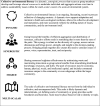Leveraging collective action and environmental literacy to address complex sustainability challenges
- PMID: 35943695
- PMCID: PMC9666603
- DOI: 10.1007/s13280-022-01764-6
Leveraging collective action and environmental literacy to address complex sustainability challenges
Abstract
Developing and enhancing societal capacity to understand, debate elements of, and take actionable steps toward a sustainable future at a scale beyond the individual are critical when addressing sustainability challenges such as climate change, resource scarcity, biodiversity loss, and zoonotic disease. Although mounting evidence exists for how to facilitate individual action to address sustainability challenges, there is less understanding of how to foster collective action in this realm. To support research and practice promoting collective action to address sustainability issues, we define the term "collective environmental literacy" by delineating four key potent aspects: scale, dynamic processes, shared resources, and synergy. Building on existing collective constructs and thought, we highlight areas where researchers, practitioners, and policymakers can support individuals and communities as they come together to identify, develop, and implement solutions to wicked problems. We close by discussing limitations of this work and future directions in studying collective environmental literacy.
Keywords: Collective action; Community; Environmental literacy; Social movements; Sustainability.
© 2022. The Author(s).
Conflict of interest statement
The authors declare that they have no known competing financial interests or personal relationships that could have appeared to influence the work reported in this paper
Figures
References
-
- Adger WN. Social capital, collective action, and adaptation to climate change. Economic Geography. 2003;79:387–404.
-
- Adler PS, Kwon S-W. Social capital: Prospects for a new concept. Academy of Management Review. 2002;27:17–40. doi: 10.5465/amr.2002.5922314. - DOI
-
- Agrawal A. Dismantling the divide between Indigenous and scientific knowledge. Development and Change. 1995;26:413–439. doi: 10.1111/j.1467-7660.1995.tb00560.x. - DOI
-
- Aguilar OM. Examining the literature to reveal the nature of community EE/ESD programs and research. Environmental Education Research. 2018;24:26–49. doi: 10.1080/13504622.2016.1244658. - DOI
MeSH terms
LinkOut - more resources
Full Text Sources
Medical


